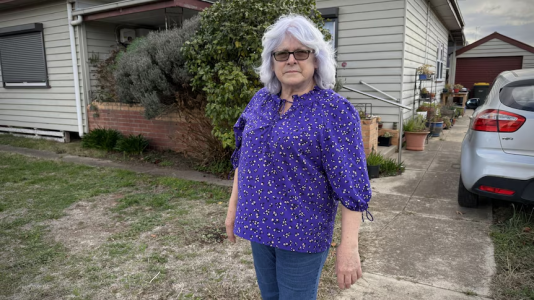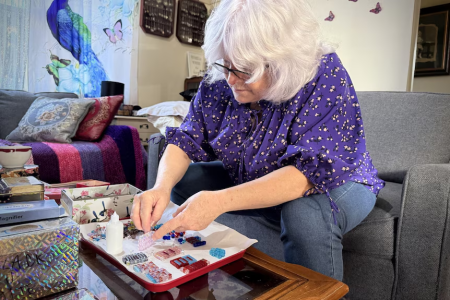Patricia is going without food to feed her cats, as she struggles to pay her mortgage — and she is not alone
By
ABC News
- Replies 1
When Patricia McGarry first saw the little corner house in a small country town, she knew it was exactly what she had been looking for.
"It was just my dream home and I was so happy to find it," she tells the ABC from her lounge room, which is full of trinkets in her favourite colour, purple.
Ms McGarry purchased the property for just over $200,000 around eight years ago and now has about $70,000 left to pay on the mortgage.
But when the 68-year-old had to quit her supermarket check-out job due to several health issues, she started to fall behind on her home loan repayments.
"When that all happened to me I went on Centrelink payments, just more or less the JobSeeker, which was about $384 a fortnight. I could not pay my house payments then," she says.
"Life was a big struggle when that all happened … I didn't have two bob to scratch."
She is among tens of thousands of Australians falling behind on their mortgage repayments, a phenomenon made worse by a string of interest rate rises alongside rising cost of living pressures.
The proportion of borrowers in arrears grew to 1.7 per cent in the first quarter of this year, according to housing research firm Cotality.
'I go without food to make sure my cats are fed'
With costs tight, Ms McGarry told the ABC she spends most of her time at home working on her craft projects and tending to her four beloved cats.
"I don't buy too much for myself. If I do it's for my crafts, which I love doing," she says, as she puts the finishing touches on the windows for a doll's house.
"I don't go anywhere. I do not go out at all … I'm just by myself with my four kitty cats and as long as they're healthy, I'm happy."
"I think the world of my cats, they're my life … They're more important than anything. They are the best little creatures in the world."
Making ends meet is a day-to-day proposition for Ms McGarry, whose cats often take priority when there is little money left for the weekly grocery shop.
"I do my best. I've gone without to make sure that they get their goods. And when I did my shopping last week, all I bought was cat food. I'm living off what's in the cupboard."
Bank suggests selling house
After she stopped work, her bank put her on a reduced payment schedule and she now pays around $1,000 a month, but she is still in arrears and worried she will be forced to sell her house and move into a rental property, which at her age she is not keen to do.
"[My bank] did tell me that maybe I should just sell up and go live somewhere else. And I thought, no, I'm not doing that. I want to live here. This is my home."
"I don't want to go into a little unit. I want to stay here because everything in this house I have got so that if I need to be in a wheelchair at any time, I can make it possible," Ms McGarry explains.
"I've got a ramp at the back that I can use to put my wheelchair up. Why would I move? My bathroom's designed for me … I did all that to help me with my health so that I could live the way I'm living, and keep living."
After the ABC contacted Patricia McGarry’s bank about the story, Ms McGarry says they reached out to her and offered to extend the life of the home loan and further reduce her monthly mortgage repayments.
She has just under $70,000 remaining on the loan.
What to do if you are struggling to pay your mortgage
Claire Tacon from the National Debt Helpline says the service has been receiving more calls from people like Patricia McGarry since interest rates started to rise in 2022.
Her advice for anyone struggling to pay their home loan was to first call their bank
“All the banks have hardship departments," she explains.
"A lot of people don't realise that there are actually rights written into the credit legislation that if your circumstances have changed and you're not able to maintain your payments on your mortgage or any credit contract that you have.
"You have the right to request a variation to that contract, your bank needs to consider your request, and they need to let you know whether they accept what you're asking.
"And, if they don't accept it, you have the right to make a complaint to the ombudsman."
While arrears rates have been rising, ratings agency Fitch noted in a recent report that the two interest rate cuts so far this year, as well as predicted further cuts, should help home owners who are struggling to pay their mortgage, eventually pushing arrears rates down.
Written by Nadia Daly, ABC News.









